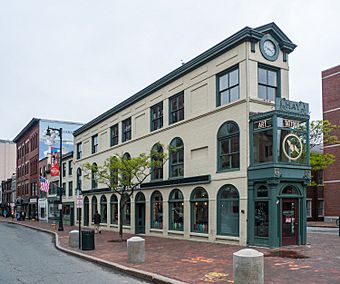Charles Q. Clapp Block facts for kids
Quick facts for kids |
|
|
Charles Q. Clapp Block
|
|
 |
|
| Location | Congress Sq., Portland, Maine |
|---|---|
| Area | 0.5 acres (0.20 ha) |
| Built | 1826 |
| Architect | Clapp, Charles Quincy; Stevens, John Calvin |
| Architectural style | Federal |
| NRHP reference No. | 78000168 |
| Added to NRHP | January 31, 1978 |
The Hay Building is a very old and important building in downtown Portland, Maine. It's also known as the Charles Q. Clapp Building. You can find it in Congress Square, where Congress, High, and Free Streets meet.
This building was designed by a famous local architect named Charles Q. Clapp. It was built way back in 1826. This makes it one of the oldest commercial buildings in all of Portland!
What Does the Hay Building Look Like?
The Hay Building is actually made up of three connected buildings. They stretch along Congress and Free Streets. The biggest part of the building has a cool triangular shape. It faces High Street.
This main part is three stories tall. It's made of brick, painted a light beige color with dark green details. The first two floors have seven arched windows. The main door is on the short side facing High Street. A third floor was added later. It has five windows and a decorative ledge above them.
The other two parts of the building are also three stories tall. They have different window styles and entrances. One has square windows, and the other has a recessed doorway.
A Glimpse into History
The main part of the Hay Building was designed by Charles Quincy Clapp. He was a local architect and merchant. It was built in 1826. This building is a great example of the Federal architectural style. It's one of the oldest commercial buildings in Portland.
In 1841, a business called Hay's Pharmacy opened on the ground floor. This is how the building got its most common name, the Hay Building.
Later, in 1922, another famous architect named John Calvin Stevens designed the third floor. It was added to the main building at that time.
The Hay Building is so important that it was added to the National Register of Historic Places. This happened on January 31, 1978. Being on this list means it's a special historical place that should be protected.
 | Calvin Brent |
 | Walter T. Bailey |
 | Martha Cassell Thompson |
 | Alberta Jeannette Cassell |



